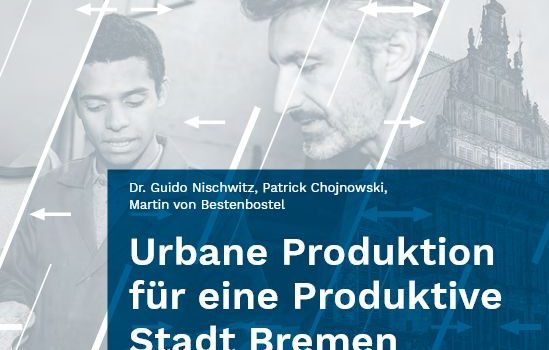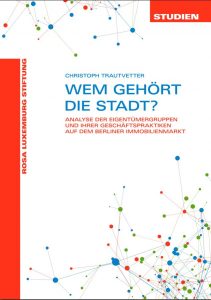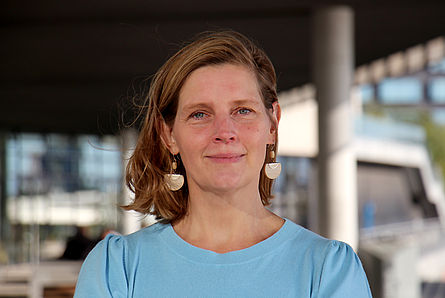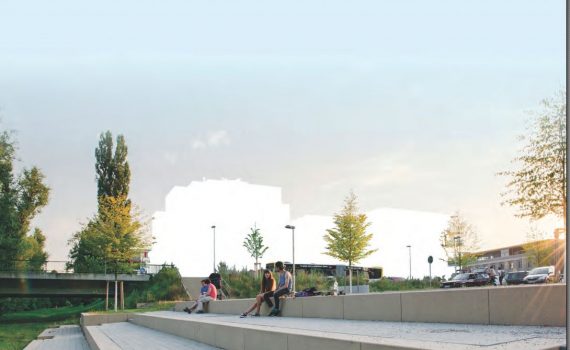The bioeconomy can be a central building block for the transformation of our largely coal, oil and gas-based economy. However, renewable raw materials and synthetic carbon compounds are scarce and expensive. They should be used in areas such as the chemical industry - not as energy sources. For the shift from a fossil-based economy to a bioeconomy to succeed, fossil carbon must also become more expensive. The ifeu now presents the results of four trend-setting studies.
Kategorie für Blog: Research
The first results of the timber housing study will be presented at the 15th Congress on Efficient Building with Wood in Urban Areas on 19 October 2022 in Cologne. So far, 118 large-volume housing projects with more than 100 units have been identified across Europe by the HFR researchers, 47 of which are located in Germany. Final results will be presented in early December at the 26th International Timber Construction Forum in Innsbruck on 30 November 2022 and will also be published in a brochure by Informationsdienst Holz.
A regenerative heat supply and an innovative rainwater management system are being designed for the "ecoSquare" neighbourhood in Bamberg. Michael Richter and Wolfgang Dickhaut are in charge of the project.
After years of separating living and working, production in the city was lost from view, outsourced from the cities. The productive city is currently the subject of intense debate, triggered by changes in production methods and new possibilities for a mix of uses. There is still a lack of nationwide studies and data analyses, especially with regard to employment effects and spatial differentiation.
 To live up to its climate change pledge under the Paris Agreement, the European Union must ensure that all 250 million existing buildings, as well as all new buildings in the EU, produce near-zero greenhouse gas emissions. In a new report, European national academies of science, through their association EASAC, call for far-reaching policy action. "Policies have long focused on creating energy-efficient buildings that require less heating and air conditioning or generate renewable energy on site. However, the energy used to operate buildings is only part of the story. We need to broaden the scope and look at emissions from building materials and methods - both for new buildings and for building refurbishment," says William Gillett, Director of EASAC's Energy Programme.
To live up to its climate change pledge under the Paris Agreement, the European Union must ensure that all 250 million existing buildings, as well as all new buildings in the EU, produce near-zero greenhouse gas emissions. In a new report, European national academies of science, through their association EASAC, call for far-reaching policy action. "Policies have long focused on creating energy-efficient buildings that require less heating and air conditioning or generate renewable energy on site. However, the energy used to operate buildings is only part of the story. We need to broaden the scope and look at emissions from building materials and methods - both for new buildings and for building refurbishment," says William Gillett, Director of EASAC's Energy Programme.
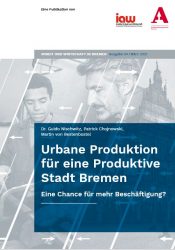 In a research project of the iaw, the conceptual foundations of urban production and the productive city were prepared with a view to the situation in Bremen and analysed in their impact structure. The study makes proposals for describing and recording urban production that is compatible with the city and embedding it in an urban development policy model of a productive city. On the basis of seven reference cities (Vienna, Zurich, Stuttgart, Hamburg, Frankfurt am Main, Wuppertal, Bochum), corresponding activities were filtered out and their transferability to the city of Bremen was examined. In the city of Bremen, eight locations and neighbourhoods (including the Tabakquartier and Kellogg-Areal) were examined with regard to their potential for implementing a productive city.
In a research project of the iaw, the conceptual foundations of urban production and the productive city were prepared with a view to the situation in Bremen and analysed in their impact structure. The study makes proposals for describing and recording urban production that is compatible with the city and embedding it in an urban development policy model of a productive city. On the basis of seven reference cities (Vienna, Zurich, Stuttgart, Hamburg, Frankfurt am Main, Wuppertal, Bochum), corresponding activities were filtered out and their transferability to the city of Bremen was examined. In the city of Bremen, eight locations and neighbourhoods (including the Tabakquartier and Kellogg-Areal) were examined with regard to their potential for implementing a productive city.
 The ecological model settlement on a former barracks site in Munich sets new standards in timber construction. Various timber construction methods and building types up to seven storeys are being tested side by side in eight building projects with the aim of a final scientific evaluation. Timber frame, timber frame and timber hybrid construction methods are being used.
The ecological model settlement on a former barracks site in Munich sets new standards in timber construction. Various timber construction methods and building types up to seven storeys are being tested side by side in eight building projects with the aim of a final scientific evaluation. Timber frame, timber frame and timber hybrid construction methods are being used.
 Dr. Kirsten David, a researcher at HafenCity University (HCU) Hamburg, has developed an innovative method for determining rent increases after energy efficiency measures: By means of functional cost splitting, rent increases become appropriate and comprehensible. The planning of the energetic measures is also ecologically optimized. For her dissertation entitled "Functional Cost Splitting for the Determination of Rent Increases after Energy Efficiency Measures", the scientist today receives the "BUND Research Award 2020". With the research award, the Bund für Umwelt- und Naturschutz (BUND) honors scientific work on sustainable development.
Dr. Kirsten David, a researcher at HafenCity University (HCU) Hamburg, has developed an innovative method for determining rent increases after energy efficiency measures: By means of functional cost splitting, rent increases become appropriate and comprehensible. The planning of the energetic measures is also ecologically optimized. For her dissertation entitled "Functional Cost Splitting for the Determination of Rent Increases after Energy Efficiency Measures", the scientist today receives the "BUND Research Award 2020". With the research award, the Bund für Umwelt- und Naturschutz (BUND) honors scientific work on sustainable development.
 Glaciers are melting, sea levels are rising, heat waves and heavy rainfall are increasing: The consequences of climate change are visible and tangible worldwide, and the window of opportunity to act is shrinking. In order to significantly limit the global effects of climate change, the emission of greenhouse gases on earth must be drastically reduced. The agreement reached by the international community in Paris in 2015 sets the goal of limiting global warming to well below 2 degrees Celsius, but preferably to 1.5 degrees Celsius. Now, the Wuppertal Institute presented a study with possible cornerstones that can help to achieve the 1.5 degree target by 2035. The study shows that a climate-neutral energy system by 2035 is very ambitious, but in principle feasible, provided that all possible strategies from today's perspective are bundled. This requires, above all, bringing forward and intensifying measures that are described in many studies as necessary to achieve greenhouse gas neutrality by 2050.
Glaciers are melting, sea levels are rising, heat waves and heavy rainfall are increasing: The consequences of climate change are visible and tangible worldwide, and the window of opportunity to act is shrinking. In order to significantly limit the global effects of climate change, the emission of greenhouse gases on earth must be drastically reduced. The agreement reached by the international community in Paris in 2015 sets the goal of limiting global warming to well below 2 degrees Celsius, but preferably to 1.5 degrees Celsius. Now, the Wuppertal Institute presented a study with possible cornerstones that can help to achieve the 1.5 degree target by 2035. The study shows that a climate-neutral energy system by 2035 is very ambitious, but in principle feasible, provided that all possible strategies from today's perspective are bundled. This requires, above all, bringing forward and intensifying measures that are described in many studies as necessary to achieve greenhouse gas neutrality by 2050.
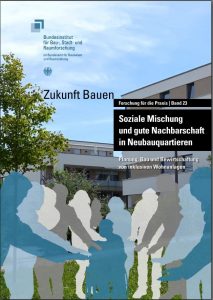 The Institute for Urban Planning and Social Research WEEBER+PARTNER (Stuttgart) examined 16 case studies and interviewed responsible persons in municipal, cooperative and private housing companies. The projects are characterized by a wide range of planning and construction approaches. According to the study, social diversity requires structural diversity: Rental, social and owner-occupied apartments of different sizes and with diverse layouts were created in the new housing quarters. They are socially mixed - even within buildings - with the respective proportions in the neighbourhood being derived from local requirements. The new quarters also offer space for communal forms of living, for example for older people and those in need of care. And they are characterised by an attractively designed and green residential environment. Concept awards promote the planning and implementation of such projects: Through them, plots of land are not allocated according to the highest price, but for the best concept.
The Institute for Urban Planning and Social Research WEEBER+PARTNER (Stuttgart) examined 16 case studies and interviewed responsible persons in municipal, cooperative and private housing companies. The projects are characterized by a wide range of planning and construction approaches. According to the study, social diversity requires structural diversity: Rental, social and owner-occupied apartments of different sizes and with diverse layouts were created in the new housing quarters. They are socially mixed - even within buildings - with the respective proportions in the neighbourhood being derived from local requirements. The new quarters also offer space for communal forms of living, for example for older people and those in need of care. And they are characterised by an attractively designed and green residential environment. Concept awards promote the planning and implementation of such projects: Through them, plots of land are not allocated according to the highest price, but for the best concept.
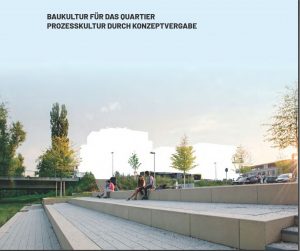 Conceptual procedures are increasingly establishing themselves as a further instrument of municipal land policy for locations with development potential. Here, the property is not allocated according to the highest price, but according to the concept that promises the most sustainable approaches to the further development of the neighbourhood. In this way, the procedures offer municipalities approaches to solving two current and urgent problems: the need for high-quality urban development and affordable housing.
Conceptual procedures are increasingly establishing themselves as a further instrument of municipal land policy for locations with development potential. Here, the property is not allocated according to the highest price, but according to the concept that promises the most sustainable approaches to the further development of the neighbourhood. In this way, the procedures offer municipalities approaches to solving two current and urgent problems: the need for high-quality urban development and affordable housing.
 Hydrogen is an important alternative for sectors stuck in the fossil fuel economy. As national governments and European parliamentarians negotiate the EU's hydrogen strategy, EASAC issues a new commentary. "Hydrogen can help reduce our dependence on fossil fuels," says William Gillett, Director of EASAC's Energy Programme. "But the climate benefits are limited if we use fossil fuels to produce it - even with carbon capture and storage. The EU must put an end to fossil fuel subsidies. The rapidly growing demand for hydrogen must be met by a massive increase in electricity generation from renewables, together with certified imports from third countries."
Hydrogen is an important alternative for sectors stuck in the fossil fuel economy. As national governments and European parliamentarians negotiate the EU's hydrogen strategy, EASAC issues a new commentary. "Hydrogen can help reduce our dependence on fossil fuels," says William Gillett, Director of EASAC's Energy Programme. "But the climate benefits are limited if we use fossil fuels to produce it - even with carbon capture and storage. The EU must put an end to fossil fuel subsidies. The rapidly growing demand for hydrogen must be met by a massive increase in electricity generation from renewables, together with certified imports from third countries."
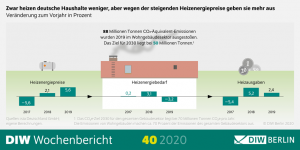 Annual DIW Heat Monitor based on data from energy service provider ista Deutschland GmbH: Heating energy demand in residential buildings declines again for the first time since 2015 - Rising prices, however, cause heating expenditure to increase by 2.4 percent - CO2emissions have fallen by 21 percent overall since 2010, but by only 2.6 percent when adjusted for temperature - Energy-efficient renovation in residential buildings almost stagnant
Annual DIW Heat Monitor based on data from energy service provider ista Deutschland GmbH: Heating energy demand in residential buildings declines again for the first time since 2015 - Rising prices, however, cause heating expenditure to increase by 2.4 percent - CO2emissions have fallen by 21 percent overall since 2010, but by only 2.6 percent when adjusted for temperature - Energy-efficient renovation in residential buildings almost stagnant
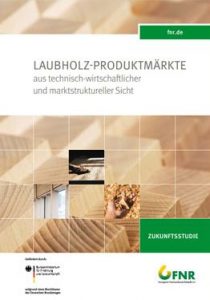 A study funded by the Federal Ministry of Agriculture determined the potential of hardwood as a substitute for coniferous wood. The results of the study are now available in a brochure published by the Fachagentur Nachwachsende Rohstoffe e. V. (FNR). There is considerable potential for hardwood to be used in industrial timber, but it cannot yet be a substitute for softwood in construction
A study funded by the Federal Ministry of Agriculture determined the potential of hardwood as a substitute for coniferous wood. The results of the study are now available in a brochure published by the Fachagentur Nachwachsende Rohstoffe e. V. (FNR). There is considerable potential for hardwood to be used in industrial timber, but it cannot yet be a substitute for softwood in construction
"The world's water resources are currently facing the greatest threat in the history of mankind," write aquatic ecologists in their recently published statement paper. More than one hundred professional societies of aquatic ecosystem research around the globe have signed the joint statement. In it, the researchers show the dramatic effects that climate change is having on aquatic ecosystems worldwide. They call for immediate concerted action by politics, business, science and society to halt the progress of climate change.
Lecture "Can we build our way out of the climate crisis?" from 16 April 2020
Among other things, Schellnhuber calls for "prompt measures to achieve the two-degree target, above all by switching from fossil to renewable energy sources and replacing finite building materials with wood and renewable raw materials."
 Eine Studie des Forums Ökologisch-Soziale Marktwirtschaft im Auftrag von Greenpeace (März 2020).
Durch die Corona-Krise wird der Staat Soforthilfen und weitreichende Konjunkturmaßnahmen historischen Ausmaßes umsetzen. Während Gesundheit und die kurzfristige Unterstützung von Arbeitnehmer*innen und Unternehmen in den Fokus rücken, dürfen die Fehler vergangener Wirtschaftskrisen nicht wiederholt werden. Die geplanten Hilfen für einen wirtschaftlichen Neustart können die Weichen stellen für die notwendige Transformation. Anhand einiger Beispiele wird illustriert, wie kurzfristige wirtschaftliche Unterstützung mit langfristigen gesellschaftlichen Prioritäten in Einklang gebracht werden können.
Eine Studie des Forums Ökologisch-Soziale Marktwirtschaft im Auftrag von Greenpeace (März 2020).
Durch die Corona-Krise wird der Staat Soforthilfen und weitreichende Konjunkturmaßnahmen historischen Ausmaßes umsetzen. Während Gesundheit und die kurzfristige Unterstützung von Arbeitnehmer*innen und Unternehmen in den Fokus rücken, dürfen die Fehler vergangener Wirtschaftskrisen nicht wiederholt werden. Die geplanten Hilfen für einen wirtschaftlichen Neustart können die Weichen stellen für die notwendige Transformation. Anhand einiger Beispiele wird illustriert, wie kurzfristige wirtschaftliche Unterstützung mit langfristigen gesellschaftlichen Prioritäten in Einklang gebracht werden können.
 Hydrogen from hydropower: successful start for one of the largest power-to-gas plants in Germany to date. This is reported by the Centre for Solar Energy and Hydrogen Research Baden-Württemberg (ZSW). The megawatt plant has been in operation for four months in April 2020 and is functioning reliably. A research electrolyser connected to it is also running successfully. The ZSW is coordinating the project. The operator of the commercial plant is the energy supplier Energiedienst AG.
Hydrogen from hydropower: successful start for one of the largest power-to-gas plants in Germany to date. This is reported by the Centre for Solar Energy and Hydrogen Research Baden-Württemberg (ZSW). The megawatt plant has been in operation for four months in April 2020 and is functioning reliably. A research electrolyser connected to it is also running successfully. The ZSW is coordinating the project. The operator of the commercial plant is the energy supplier Energiedienst AG.
 In research, neighbourhoods have been recognised as an important level of action for climate protection. For this reason, the BMBF, BMU and the Federal Ministry of Building and Transport have funded several research projects on sustainable neighbourhoods, which are now being worked on. The consensus of the research projects presented and the funding bodies is that it is important to research neighbourhood concepts for a climate-friendly heat and electricity supply as well as an environmentally friendly mobility offer in an economical way" and "to link the individual elements in the sense of a functioning sector coupling in a meaningful way."
The focus articles in the "Ecological Economy 3/2019" issue highlight the potential of the neighbourhood approach for the implementation of climate protection measures, but also present best practice examples and discuss feasibility in practice.
In research, neighbourhoods have been recognised as an important level of action for climate protection. For this reason, the BMBF, BMU and the Federal Ministry of Building and Transport have funded several research projects on sustainable neighbourhoods, which are now being worked on. The consensus of the research projects presented and the funding bodies is that it is important to research neighbourhood concepts for a climate-friendly heat and electricity supply as well as an environmentally friendly mobility offer in an economical way" and "to link the individual elements in the sense of a functioning sector coupling in a meaningful way."
The focus articles in the "Ecological Economy 3/2019" issue highlight the potential of the neighbourhood approach for the implementation of climate protection measures, but also present best practice examples and discuss feasibility in practice.
 Konturen einer solidarischen Stadtpolitik
Anton Brokow-Loga (Hrsg.),
Frank Eckardt (Hrsg.)
Städte ohne Wachstum – eine bislang kaum vorstellbare Vision. Doch Klimawandel,
Ressourcenverschwendung, wachsende soziale Ungleichheiten und viele andere
Zukunftsgefahren stellen das bisherige Allheilmittel Wachstum grundsätzlich infrage. Wie wollen
wir heute und morgen zusammenleben? Wie gestalten wir ein gutes Leben für alle in der Stadt?
Konturen einer solidarischen Stadtpolitik
Anton Brokow-Loga (Hrsg.),
Frank Eckardt (Hrsg.)
Städte ohne Wachstum – eine bislang kaum vorstellbare Vision. Doch Klimawandel,
Ressourcenverschwendung, wachsende soziale Ungleichheiten und viele andere
Zukunftsgefahren stellen das bisherige Allheilmittel Wachstum grundsätzlich infrage. Wie wollen
wir heute und morgen zusammenleben? Wie gestalten wir ein gutes Leben für alle in der Stadt?
The federal government can give a short-term boost to public housing construction in Germany and thus help to ease the acute housing shortage in many large cities. The key to this is three federally owned companies that provide flexible support to the federal states and local authorities in the development of construction projects and the construction of new housing: Firstly, a consultancy company that provides planning capacities to cities and municipalities. Secondly, a land fund that provides financial and conceptual support to local authorities nationwide in acquiring building land and financing infrastructure. Thirdly, an investment company that strengthens the equity of municipal housing construction companies through financial participation. Prof Dr Sebastian Dullien, Scientific Director of the Institute for Macroeconomics and Economic Research (IMK) at the Hans Böckler Foundation, and Prof Dr Tom Krebs from the University of Mannheim show this in a new concept for a federal "Future Housing" initiative.
A research project conducted by natureplus in conjunction with IFEU compares insulation materials with regard to their environmental impact throughout their entire life cycle, including recovery and recycling.

 Which insulation material is the best? This question is extremely popular in the construction industry and can ultimately only be answered in the context of the respective construction. In particular, there has so far been a lack of a holistic overview that enables builders and planners to identify the strengths and weaknesses of the various insulation material alternatives in terms of their life cycle assessment, without having to disregard subsequent disposal.
Which insulation material is the best? This question is extremely popular in the construction industry and can ultimately only be answered in the context of the respective construction. In particular, there has so far been a lack of a holistic overview that enables builders and planners to identify the strengths and weaknesses of the various insulation material alternatives in terms of their life cycle assessment, without having to disregard subsequent disposal.
 27.01.2020 A material revolution that replaces cement and steel with wood in urban construction can have double benefits for climate stabilization. This is now shown in a study by an international team of scientists. First, it can avoid greenhouse gas emissions from cement and steel production. Secondly, it can turn buildings into carbon sinks, since in the construction timber the CO2 is stored. Although the required amount of wood is theoretically available, such an expansion would require very careful sustainable forest management, the authors emphasize.
27.01.2020 A material revolution that replaces cement and steel with wood in urban construction can have double benefits for climate stabilization. This is now shown in a study by an international team of scientists. First, it can avoid greenhouse gas emissions from cement and steel production. Secondly, it can turn buildings into carbon sinks, since in the construction timber the CO2 is stored. Although the required amount of wood is theoretically available, such an expansion would require very careful sustainable forest management, the authors emphasize.
 One of the Herculean tasks to achieve the climate targets is to radically reduce CO2 emissions from the heat supply. A group of researchers led by the Institute for Ecological Economy Research (IÖW) shows how cities can turn away from coal, oil and gas in a socially acceptable way. The project "Urban Heat Turnaround" investigated possible contributions from renewable energies and local heat sources in Berlin's urban neighbourhoods. "Waste heat from businesses, heat from waste water or geothermal energy have hardly been used so far.
One of the Herculean tasks to achieve the climate targets is to radically reduce CO2 emissions from the heat supply. A group of researchers led by the Institute for Ecological Economy Research (IÖW) shows how cities can turn away from coal, oil and gas in a socially acceptable way. The project "Urban Heat Turnaround" investigated possible contributions from renewable energies and local heat sources in Berlin's urban neighbourhoods. "Waste heat from businesses, heat from waste water or geothermal energy have hardly been used so far.
 Decentrally generated electricity from renewable energies can cover the demand for electrical energy in Bavaria both in balance and in perspective. This is the result of a joint study by the grid operators Bayernwerk Netz GmbH (Bayernwerk), LEW Verteilnetz GmbH (LVN) and Main-Donau Netzgesellschaft. The Bavarian power grid operators have analysed which development paths are possible for Bavaria with regard to renewable power generation and whether climate neutrality can be achieved in the power sector. The grid operators received scientific support from the Forschungsstelle für Energiewirtschaft e.V. (Research Centre for Energy Economics).
Decentrally generated electricity from renewable energies can cover the demand for electrical energy in Bavaria both in balance and in perspective. This is the result of a joint study by the grid operators Bayernwerk Netz GmbH (Bayernwerk), LEW Verteilnetz GmbH (LVN) and Main-Donau Netzgesellschaft. The Bavarian power grid operators have analysed which development paths are possible for Bavaria with regard to renewable power generation and whether climate neutrality can be achieved in the power sector. The grid operators received scientific support from the Forschungsstelle für Energiewirtschaft e.V. (Research Centre for Energy Economics).
 With the successful implementation of the state program "Area-wide Safety Charging Network for Electric Vehicles" (SAFE), Baden-Württemberg is the first state to have an area-wide charging network for electric cars in a 10-kilometer grid. The SAFE charging network consists of more than 450 charging stations.
With the successful implementation of the state program "Area-wide Safety Charging Network for Electric Vehicles" (SAFE), Baden-Württemberg is the first state to have an area-wide charging network for electric cars in a 10-kilometer grid. The SAFE charging network consists of more than 450 charging stations.
The call for proposals "City of the Future - Towards Plus-Energy Neighbourhoods" builds on previous experience from the research programme specific focus areas and R&D services. All stakeholders who are involved in research and development issues relating to buildings, neighbourhoods and cities and who want to tackle the new challenges of digitalisation in the construction industry, the realisation of plus-energy neighbourhoods and the development of innovative urban greening technologies can submit proposals. Around €8.3 million is available for the 7th call for proposals as part of the "City of the Future" programme. The call runs until 30 January 2020.
From the meeting of the Berlin Senate on 24 September 2019: At its meeting today, the Senate adopted the report to the House of Representatives on "Sustainability in construction: Berlin builds with wood", following a presentation by the Senator for the Environment, Transport and Climate Protection, Regine Günther. The Senate is consistently pursuing the goal of making Berlin [...]
The Agency for Renewable Resources (Fachagentur Nachwachsende Rohstoffe e. V. - FNR) supports potential applicants in applying for funding with a guideline for submitting outlines and applications for projects in the field of the Forest Climate Fund. (FNR) supports potentially interested parties in applying for funding. The guide is available in print and for download. The 58-page brochure in A5 format provides condensed information on the funding procedure and explains [...]
In 20 real laboratories across Germany, companies will be testing new hydrogen technologies on an industrial scale and in a real environment. Today, Federal Minister of Economics and Technology Peter Altmaier announced the winners of the "Energy Transition Real Labs Ideas Competition". With the Energy Transition Real Labs, sustainable energy technologies are tested under real conditions and on an industrial scale. The central theme [...]
Augsburg, 22.02.19: Together with partner company EXYTRON, Stadtwerke Augsburg (swa) has installed and commissioned the world's first decentralised power-to-gas plant in an existing residential complex. This enables a challenge of the energy transition to be mastered: surplus, regeneratively generated electricity is converted into synthetic natural gas and can thus be stored on site. Combustion then takes place in a commercially available combined heat and power plant and condensing boilers. In this way, over 180 residents in 70 apartments in the residential complex of the Augsburg housing group, which has existed since 1974, are supplied with climate-friendly electricity and heat.
From building to neighbourhood: The current issue of the specialist journal "Information on Spatial Development" (IzR), published by the Federal Institute for Research on Building, Urban Affairs and Spatial Development (BBSR), shows how entire urban districts can be developed in a climate-friendly and energy-efficient way.
Project platform for exploring electricity-to-gas (SzG) technology in the Thüga Group successfully completed Important findings have been collected and scientifically validated in the past five years of project work SzG and gas distribution grids are an integral part of the energy transition Policy must create appropriate framework conditions Frankfurt/Munich 08.08.2017: The Thüga Group's project phase for exploring electricity-to-gas [...]
The ForschungsVerbund Erneuerbare Energien (FVEE) is today publishing its latest conference volume entitled "Research for the energy transition - shaping the energy system". The papers collected here from the last annual conference present current research findings and instruments for a successful energy transition. The spectrum of contributions ranges from scenarios for the transformation of the [...]
The Federal Institute for Research on Building, Urban Affairs and Spatial Development (BBSR) has published two brochures providing information on the portals ÖKOBAUDAT and WECOBIS. WECOBIS - Web-based ecological building materials information system Download (PDF, 5MB) www.bbsr.bund.de/...2014-16/band-07-dl.pdf ÖKOBAUDAT - Basis for life cycle assessment Download (PDF, 7MB) www.bbsr.bund.de/...2017/band-09-dl.pdf





